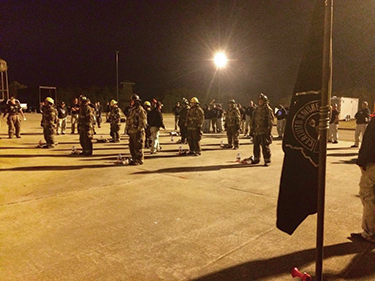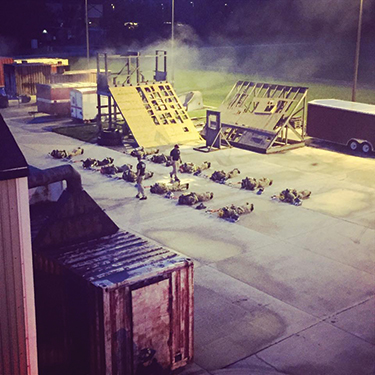BY PEDRO CÁCERES
After completing the Indiana Smoke Diver program (a sister course to the Georgia Smoke Diver course started by Indiana firefighters who had completed the Georgia program), I was commonly asked, “Did you think it was worth it?” My answer was, emphatically, “Yes!” Every second of the training, the drills, the workouts, and the lessons was a revelation. However, I found it harder to explain everything I thought and felt while preparing for and finally completing the challenge. This accomplishment means something different to everyone who successfully completes it because the value of our accomplishments does not come from what we achieve but rather from the work and sacrifices we make to achieve our goals. So, what did my achievement mean to me?
In 2010, I entered the Georgia Smoke Diver course line for the first time. I failed because I was overconfident and not well prepared mentally; it started with the fact that I didn’t even know why I was there. Perhaps it was the lure of the black T-shirt or the idea that, somehow, this program would magically make me “cool.” Or, maybe the course would make me better than others. These were all the wrong reasons to take on this challenge.
 |
| (1) Early morning formation at the Indiana Smoke Diver course. The day begins before the sun comes up. (Photos by Nolan Bastien.) |
Regardless of the reason or lack thereof, in my mind, this challenge would not be as difficult for me; I have always enjoyed training. I had been in reasonably good shape from training for and competing in several triathlons. So, overconfident and without a clear goal, I stepped up to the line and failed miserably. It was a tremendously humbling and eye-opening experience. After this first attempt, I wrote the following about my first impression of the program:
“First, I must say that the general perception of the smoke divers being an elitist group of super athletes or firefighters that are looking to show off by competing is completely wrong. There is no doubt that good physical fitness is needed to complete the program, but it is also important to be mentally prepared and fit to be successful. The reality is that the program is about better preparing firefighters for safe, everyday firefighting with an emphasis on avoiding emergency situations. Additionally, it is an excellent program to teach firefighters how to react to emergency situations.”
Trying Again
I don’t think that my assessment was wrong that first year. In 2011, I trained again with the idea that I would return to Georgia. A couple of months before the class, I realized that I was, again, not ready. Although at the time I was feeling better physically, I was still not mentally prepared. So, I did not make the journey.
In 2012, I successfully completed the Georgia FLAMES (Firefighters Laboring And Mastering Essential Skills) program. It was a very different program, but it shared some common goals with the Smoke Diver program. FLAMES was an important component of my learning process; it was a good way to take on a challenge and learn more about myself. With some confidence restored and a better understanding of why I was training, I began to train hard again for the Smoke Diver course.
In 2013, I attempted the Indiana Smoke Diver program again. Once again, mental errors led to physical breakdown, and I was out again on the second day. The disappointment from this attempt was beyond words, not just to me and my family but to many others who had encouraged and supported me over the years. It is important to note that from the first failed attempt I was encouraged by smoke divers to not give up, to continue to train. Several of them gave up their time and trained alongside me and challenged me to push further. Many of them shared strategies and ideas on mental preparation. So long as I did not give up, those smoke divers did not give up on me.
 |
| (2) Morning physical training. The students are in gear to start the day. |
In 2014, despite the questions and second-guessing by many, I stepped up to the line once again. The previous four years had been full of frustration, disappointment, anger, and fear. They had also been filled with encouragement, hope, commitment, and determination. At last, I was successful! So, why put myself through all of this? What does it all mean?
A Battle Against Ourselves
We all have our reasons for taking on challenges, but a common reason might be simply that we want to be better. Not better than anyone else but better than we were before. It is a battle against ourselves. To get better, we have to push ourselves outside of our comfort zone. We need to push beyond the everyday limits we impose on ourselves. Successfully completing this program leads to confidence, which allows us to perform better, to share knowledge gained with others, and to push further again. This was certainly the case for me, but just as for everyone else, there is more.
I have always looked for opportunities to be better-not for me but for my family. I want them to know that I tried my best and that if one day I must pay the ultimate price, there will be no doubt that I did everything I could and did not selfishly put them in a bad position. This has always been my motivation.
“Never give up, keep your eye on the target, and keep driving forward no matter what.” I have preached these words to my children for many years. I did not want to just talk about it; I wanted to show them that regardless of the obstacles, there is always another way or another opportunity to try again and achieve your goals and dreams. The Georgia and Indiana Smoke Diver creed reads in part “I will try again. I will make one more attempt to close with victory, and if that fails, I will make another.” I wanted my children to see and understand the meaning of perseverance and, more importantly, the power of commitment.
In 2013, after failing on my third attempt, my son said matter-of-factly, “You’ll get it next year.” At that time, I was not even sure I would attempt the course again. My son and daughter knew I would not give up. I believe my son and daughter understand the power of perseverance. It is a lesson I hope they never forget.
Commitment is everywhere in the Georgia and Indiana Smoke Diver programs. To successfully complete the program, you have to be committed to putting in the work before class, long workouts, and endless training. You cannot skip the work, and you cannot take shortcuts. You must be committed to sacrificing time with friends and family and to do whatever it takes to charge forward and never give up.
Of course, this program does not run itself; it requires a tremendous amount of work and commitment from instructors and logistical staff who work countless hours before, during, and after each class to ensure all goes according to plan. The instructors are selflessly giving up their time with no compensation because they want to make a difference; they understand the value of the servant leadership required to run the program. They, too, put in long hours and sacrifice time with friends and family to deliver the best experience possible for the candidates.
Everyone involved in these two Smoke Diver programs-instructors, support staff, candidates, and anyone who has ever stepped up to that line (successful or not)-is fulfilling commitments to each other and to a better, safer fire service. We are all looking out for each other and for our families and fulfilling our commitment to the communities we serve. We will be there, better prepared and ready to assist without hesitation, because of the confidence gained from the preparation, performance, and successful completion. The individual gains are shared with others. The goal is always to improve not just yourself but also others around you; we pass it on. The knowledge and skills learned are shared with others in or out of these Smoke Diver programs. All firefighters can benefit, regardless of whether or not they attended the class. So, we can go back to the beginning: It means more than words can really express, and it was absolutely worth it!
The Georgia and Indiana Smoke Diver courses are a six-day, 60-plus-hour program designed for the experienced firefighter who desires realistic training in self-survival, firefighter rescue, advanced search and rescue, thermal imaging, emergency procedures, teamwork, discipline, team leadership, situational awareness, and decision making as well as how to function within the elements of the incident command system. The mission of the programs is to “prevent death and injury by training firefighters to be adaptable and to develop critical decision-making skills.”
For additional information, visit IndianaSmokeDiver.com or GeorgiaSmokeDiver.com.
PEDRO CÁCERES is a captain for the Wayne Township (IN) Fire Department and is assigned to Engine 82’s A-shift.

